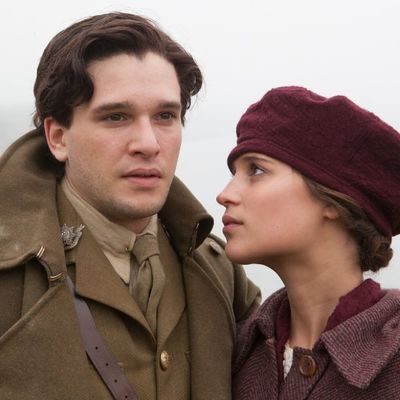
Should you ever be tempted to wax nostalgic for an age in which wars were fought according to the laws of cause and effect and for reasons that may confidently be labeled “rational,” pick up Vera Brittain’s World War I memoir Testament of Youth or steel yourself for James Kent’s mournful, very fine new film starring Alicia Vikander as Brittain. The “Great War” made so little sense relative to its cost in lives that it gave birth to a new era in literature and art and a new breed of tragedy; after this, nothing would be expected to happen according to divine logic. Despite a centennial and such recent works as War Horse, the horror of the war has faded, at least on this side of the Atlantic. It’s time for the testament of Brittain and the Brits to be reheard.
The beginning of Testament of Youth prepares you for the end. In a prologue set in 1918 on the day of the Armistice, the palette is a chill blue and Vera wanders dazed through the jubilant crowds into a church where mourners light candles for the dead. Warm colors are reserved for early flashbacks in which Vera swims in a pond beside her brother, Edward (Taron Egerton), and his smitten friend, Victor (Colin Morgan), buoyed by the prospect of entrance exams for Oxford University — and a place alongside the men who regard her with awe.
But she returns to her well-to-do Newcastle house to find that her father (Dominic West) has bought her a piano with the money she’d requested be spent on tuition. As she rails against prevailing social norms — among them that young ladies of her class should choose marriage over higher education — she is gobsmacked by the arrival of Edward’s dreamboat friend Roland Leighton (Kit Harington). Perhaps marriage and university are not mutually exclusive … Soon, she and Roland are strolling through the fields discussing his poetry, which she finds shimmering and lyrical but not sufficiently personal. You know nothing, Roland Leighton. Oh, dear: Has she driven him off?
So far, so conventionally romantic, and the giddiness continues through Vera’s plucky assertion to a dubious female Oxford instructor (Miranda Richardson) that in spite of her pampered exterior, she has the strength and conviction to be an outstanding scholar. When the archduke is assassinated and war eventually ensues, young men of all classes are eager to enlist: “They say that the war will be short!” The first glimpses of barbed wire, trenches, lakes of mud, and the effects of poison gas do more than dampen the mood. They alter the genre altogether.
Working from a deft if perhaps too tidy screenplay by Juliette Towhidi, Kent brings an aura of jitter and claustrophobia to material that’s often a springboard for epic directorial flourishes. That this is partly the result of a low budget (production was begun without financing fully in place) is beside the point: A resourceful artist makes a virtue of his or her limitations. As Vera — now a nurse — hovers helplessly over rows of dead and dying men, the devastation registers as starkly as the sight of exploding shells. It’s the aftermath that Brittain witnessed, enough meaningless death to make her understand the words of the common soldier Michael Williams at Shakespeare’s Agincourt: “I am afeard there are few die well that die in a battle.”
With appearances in this film, Ex Machina, and the coming The Man From U.N.C.L.E., The Light Between Oceans, and The Danish Girl, Vikander is this year’s Jessica Chastain, and on the basis of what I’ve seen, the hype for the young Swedish actress is justified. Apart from her unconventional beauty (still photographs don’t do her justice), she has a ballerina’s gift of intense focus and the ability to move in a way that’s just so. Instinctively she knows that Vera Brittain’s primary role in the story is not to wrest control of the narrative but to bear witness — and to grieve. Vera is a woman from whom everything is taken. She has no radiant perception of God on high and no final perception of transcendence. She writes in what she knows is a vain effort to fill an unfillable void.
Brittain’s turning point — in the film and her memoir — is when she is assigned to minister in the field hospital not to her fallen countrymen but to the “dirty Huns,” many of whom are delirious and dying. Fluent in German, she understands their cries and can no longer bring herself to hate them for the deaths of her loved ones. Her Testament of Youth (not completed until 1933) became a cornerstone of the pacifist movement, and led her to take a public stand (dramatized in the film) against punishing the defeated “Huns” in the spirit of revenge. She was right not merely from a humanist standpoint but a tactical one: The rise of the Third Reich was at least in part a consequence of the Allies’ harsh retributions. There was a logic to World War II — though not the kind invoked in tributes to our “Greatest Generation.”
Brittain spoke for the ones who couldn’t speak, who were robbed of their futures for reasons they couldn’t understand at the behest of men who couldn’t have explained if they’d tried. Watching the final scenes of Testament of Youth, it’s clear that her stand is as unfashionable today as it was then. Who dares to say none die well that die in battle? It’s perfectly understandable that Jeb Bush would cite respect for dead soldiers as grounds for refraining from criticizing his brother’s catastrophic occupation of Iraq: To say that those men and women died for at best a mistake and at worst a criminal lie would be — in the eyes of the Americans whose votes he seeks — to rob their deaths of meaning. How could their patriotism survive? How could anyone accept the idea of a divine logic?





